| |
| |
4 February, Friday |
 |
|
| Plenary Session 2 - India in a global context |
| India
plays a crucial role in achieving the millennium development
goals not only because of its population but because models
of success in India hold promise for the developing world
at large. The country has done well on several fronts including
reduction of poverty and improvements in literacy, and its
commitment to national and global environmental governance.
There is, however, a long way to go on several other fronts
such as health. This session will present an overview of the
current scenario in India on select development issues, in
a global context. It will bring into discussion, factors responsible
for success and failures, touching on issues of financing,
institutions and governance, service and delivery mechanisms,
empowerment and stakeholder participation.
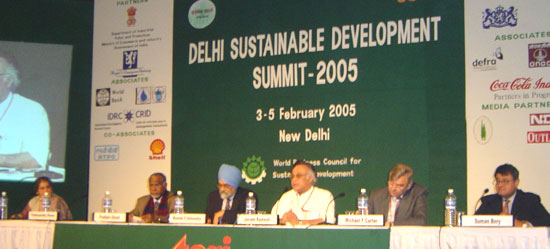 |
| Left
to right: Ms Preety Bhandari, Director, Policy Analysis,
TERI, New Delhi; Dr Prodipto Ghosh, Secretary, Ministry
of Environment and Forests, New Delhi; Mr Montek Singh
Ahluwalia, Hon'ble Deputy Chairman, Planning Commission,
New Delhi; Mr Jairam Ramesh, Hon'ble Member of Parliament
Rajya Sabha, New Delhi; Mr Michael F Carter, Country Director,
The World Bank, New Delhi; Mr Suman Bery, Director-General,
National Council of Applied Economic Research, New Delhi |
| |
|
 Mr Montek Singh Ahluwalia
Mr Montek Singh Ahluwalia
Hon'ble Deputy Chairman, Planning Commission,
New Delhi
'In this country, we have been focusing on poverty alleviation,
environmental sustainability, and globalization, but for
a long time it was in compartmentalized areas. What is
happening now is that the way policy issues are addressed,
they operationalize in all these areas together.' |
| |
|
|
|
| |
|
| Ministerial
Session 2 - Sectoral linkages in attaining Sustainability |
| In
charting out a national vision for sustainable development,
it is imperative to design policies that are based on an understanding
of cross-sectoral linkages. This session will bring together
ministers of diverse portfolios to discuss approaches to strengthen
this integration. |
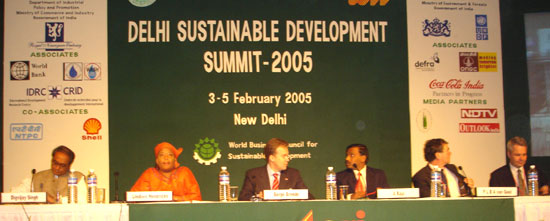 |
| Left
to right: Mr Digvijay Singh, Former Chief Minister of
Madhya Pradesh & General Secretary - All India Congress
Committee, New Delhi;Ms Lindiwe Hendricks, Hon'ble Deputy
Minister of Trade and Industry, Government of South Africa;
Mr Børge Brende, Hon'ble Minister for Trade &
Industry, Norway; Mr A Raja, Hon'ble Minister for Environment
& Forests, India; Mr P L B A van Geel, Cabinet level,
State Secretary, Ministry of Housing,Spatial Planning
and the Environment, The Netherlands; Mr Pekka Haavisto,
Chairman, UNEP Post-Conflict Assessment Unit and Former
Minister for Environment and Development Cooperation,
Govt of Finland |
| |
|
 HE Ms Lindiwe Hendricks
HE Ms Lindiwe Hendricks
Deputy Minister of Trade and Industry,
Government of South Africa
'Social development is linked with poverty alleviation,
job creation, and economic growth. There can be no sustainability
without economic growth.' |
| |
|
|
 Mr A Raja
Mr A Raja
Hon'ble Minister for Environment &
Forests, India
'The partnership between the environment ministry and
TERI is symbolic of the alliances needed to energize the
protection of our planet.' |
|
|
| |
|
|
| |
|
 Mr P L B A van Geel
Mr P L B A van Geel
Cabinet level, State Secretary, Ministry
of Housing,Spatial Planning and the Environment, The Netherlands
'On 16 February, the Kyoto Protocol comes into effect.
It is a giant leap for man but a small step for mankind.
It is essential but not enough.' |
| |
|
|
|
 |
|
| Plenary
Session 3 - Water supply, health & hygiene |
| Access
to safe drinking water, sanitation and hygiene are the prerequisites
to ensuring good health of the population and overall socioeconomic
development. This session will focus on factors that are key
in improving the quality of water supply and sanitation service
delivery. In particular, it will highlight successful experiences
in sector reforms and institutional arrangements including
demand responsive approaches and community participation in
investments, ownership, decision making, and operation and
maintenance.
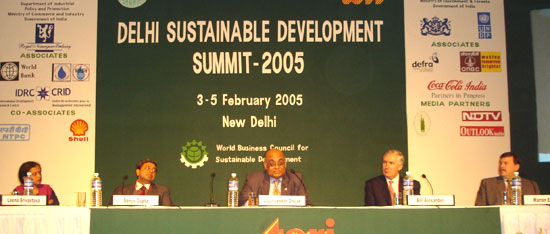 |
| Left
to right: Dr Leena Srivastava, Executive Director, TERI,
New Delhi; Mr Sanjiv Gupta, President & CEO, Coca-Cola
India; Mr Gourisankar Ghosh, Executive Director, Water
Supply and Sanitation, Collaborative Council, Geneva;
Mr Bill Alexander, Chief Executive, RWE Thames Water,
UK; Mr Warren Evans, Director of Environment, The World
Bank |
| |
|
 Mr
Bill Alexander
Mr
Bill Alexander
Chief Executive, RWE Thames Water, UK
'Our
aim is not to make profits but to recover costs.'
|
| |
|
|
 Dr
Leena Srivastava
Dr
Leena Srivastava
Executive Director, TERI, New Delhi
'The key challenge is of managing a sizeable investment
because we have a high level of costs and because water
consumption does not pay in itself.' |
|
|
| |
|
|
|
| |
|
| Keynote
Address |
Title
The Greenhouse Effect and its Climatic Consequences
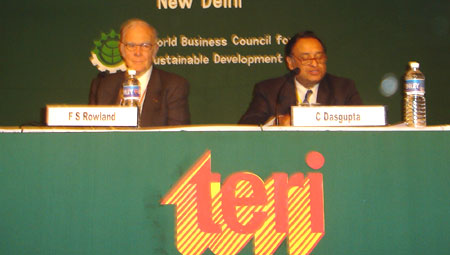 |
| Left
to right: Nobel Laureate Prof. F. Sherwood Rowland, Donald
Bren Research Professor of Chemistry and Earth System
Science, University of California, USA; Mr C Dasgupta,Distinguished
Fellow, TERI, New Delhi; |
| |
|
 Nobel Laureate Prof. F. Sherwood Rowland
Nobel Laureate Prof. F. Sherwood Rowland
Donald Bren Research Professor of Chemistry
and Earth System Science, University of California, USA
'Global warming is not expected to be uniform; it will
be more in the North.' |
| |
|
|
|
| |
|
| Plenary
Session 4 - Rural energization for poverty alleviation |
This
session will draw on international experience to discuss the
success factors in making rural energization more effective
in addressing poverty. Specifically, the session will deliberate
on the necessity to move beyond “basic needs”
and explicitly address productive needs as an objective of
rural energization. It will address issues related to appropriate
demand analysis, tariff and connection policies, choice of
technologies, financing and delivery mechanisms including
the role of governments at the village level, the community,
and other non-governmental organizations, private participation
in infrastructure provision and the need for complementary
infrastructure for overall rural development.
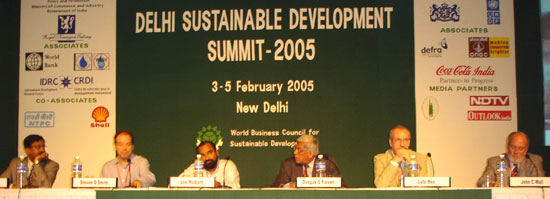 |
| Left
to right: Mr I H Rehman, Associate Director, Action Programmes,
TERI; Mr Steven D Smith, Senior Managing Director, Ritchie
Capital, USA; Dr Joe Madiath, Executive Director, Gram
Vikas. Orissa, India; Mr Deepak S Parekh, Chairman, Housing
Development Finance Corporation Limited, Mumbai, India;
Dr Lutz Mez, Executive Director - Geschäftsführer,
Environmental Policy Research Centre, Free University
of Berlin, Germany; Dr John C Wall, Vice President - Chief
Technical Officer, Cummins Inc., Columbus, USA |
| |
|
 Dr
Joe Madiath
Dr
Joe Madiath
Executive Director, Gram Vikas. Orissa, India
'We
do not need rocket science. What we need from our policy-makers
is the will to do something with and for the villages.'
|
| |
|
|
 Dr
John C Wall
Dr
John C Wall
Vice President - Chief Technical Officer, Cummins Inc.,
Columbus, USA
'Right technology matters! We have to understand the applications
and then identify the right technology for rural electrification.' |
|
|
| |
|
|
|
| |
|
| Reception
and Dinner (Venue: Hotel Taj Mansingh,
New Delhi) |
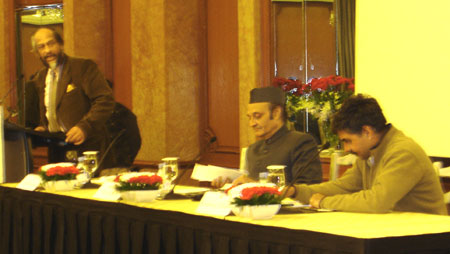
|
| Left
to right: Dr R K Pachauri, Director-General, TERI; Mr
Sandeep Dikshit,Hon'ble Member of Parliament, India;Dr
Karan Singh,
Hon'ble Member of Parliament, Rajya Sabha, New Delhi |
| |
|
 Dr
Karan Singh
Dr
Karan Singh
Hon'ble Member of Parliament, Rajya Sabha, New Delhi
|
| |
|
|
|
|
| |
|

